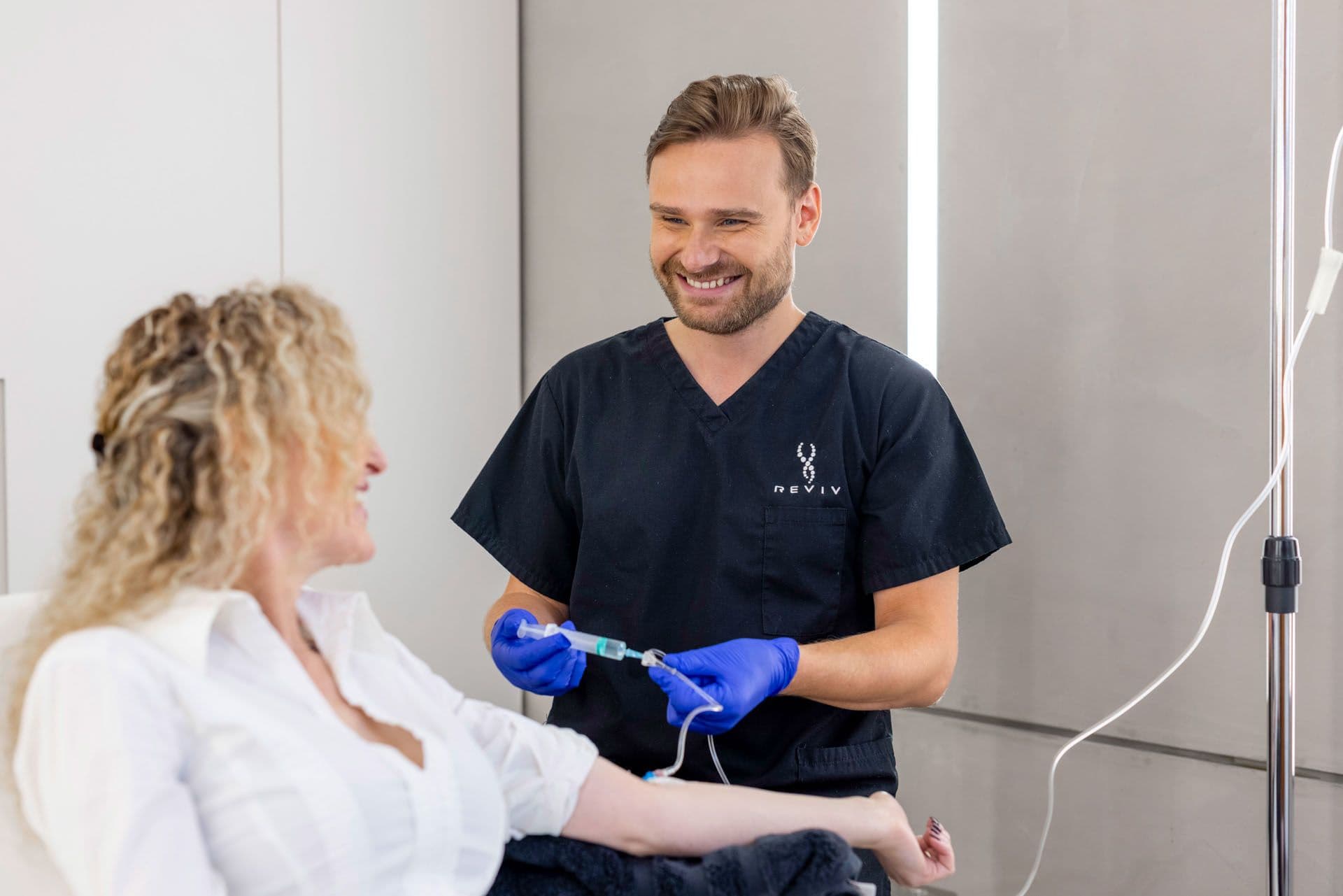Menopause And IV Drip Therapy

Menopause explained
The menopause occurs when your sex hormone levels drop, and your periods stop. The perimenopause is when menopause symptoms start but your periods haven’t yet stopped. Hormones are your body’s chemical messengers. When levels fall, the body’s ability to run many of its functions becomes impaired.
The menopause usually happens between the ages of 45 and 55 but might start naturally earlier than this. If you’ve had intervention like a hysterectomy, where your uterus is surgically removed, or you’ve had an oophorectomy, where you’ve had your ovaries removed, it might start earlier.
Other reasons you might start the menopause earlier is if you’ve had cancer treatments like chemotherapy or there is another genetic reason. There will be occasions where it cannot be explained.
Just some of perimenopause and menopause symptoms include headaches, migraines, hot flashes/flushes and brain fog.

Symptoms
Typical symptoms are anxiety, mood swings, low self-esteem, brain fog, hot flashes/flushes, night sweats and irregular periods. But you might also experience trouble sleeping, headaches and or migraines, your skin may become itchy and dry, vaginal dryness, a chance in body shape and weight gain, muscle aches and joint pain and reduced sex drive.
In some people symptoms can have quite a dramatic impact on their everyday life and inevitably end up affecting their relationships, family life, social life and work.
Findings from a survey commissioned by Finestripe productions to be used in British documentary on Channel 4, Davina McCall: Sex, Mind and The Menopause, were stark. Out of 4,000 women 1 in 10 women had left their job due to menopause symptoms. 14 per cent had reduced their hours, 14 per cent had gone part-time and eight per cent had not applied for a promotion.
It also revealed that nearly half (45 per cent) of the women surveyed had not talked to a medical professional about menopause.
Dr Michael Barnish, Head of Life Science at REVIV Global, says: “These are devastating statistics that’s why it’s incredibly important that if you are experiencing any symptoms you talk to a clinical professional for advice and support. There is help out there and no one should be suffering in silence.”
“No one should suffer in silence,” says Dr Michael Barnish, Head of Life Science at REVIV

Treatment
Hormone Replacement Therapy, or HRT for short, is the conventional treatment for menopause. Estrogen is prescribed as skin patches, a gel or spray, implants or tablets and they come in varying doses.
The aim is to replace the estrogen that your body has stopped producing.
Progesterone will be offered also if you still have your uterus (womb) to help protect the lining from estrogen. Progesterone comes in the form of patches, creams, an IUS (intrauterine system/coil) and tablets.
Both estrogen and progesterone are available in s available in synthetic and bioidentical forms (bioidentical the extract same chemical structure of estrogen found in the human body as opposed to synthetic).
Taking HRT is your choice and there are a number of non-hormone medicines that could help with symptoms.
Currently, paroxetine mesylate 7.5 mg is the only non-hormonal pharmacologic therapy approved by the FDA for treating moderate to severe hot flash/flush symptoms in postmenopausal women.
IV drip therapy and the menopause
With the withdrawal of hormones many of the metabolic processes in the body become disrupted and impaired and in many people these disruptions manifest as symptoms.
With both the perimenopause and menopause, there is a fall of progesterone, estrogen and testosterone which result in the common and broad symptoms experienced by so many people.
The body’s metabolic pathways are changed forever, some functions lost completely, like menstruation, and some functions lose their regulation.
Dr Michael Barnish adds: “Nutrients, such as vitamins, proteins and minerals are essential in many of the daily metabolic activities undertaken by the body, including many of those previously regulated by these hormones.
Ensuring that you have a normal nutritional status across all the required nutrients can help to ensure that the new peri or post-menopausal metabolism is working as effectively as it could, helping to stabilize any disruption and keeping the symptoms more in control.”

IV drip therapy may support wellness during the perimenopause and the menopause.
The role specific nutrients could play
Intravenous drip therapy can deliver certain nutrition, including many vitamins, antioxidants and minerals directly into the blood stream, bypassing the digestive tract to provide a faster and more effective absorption.
Various studies have been done to look how particular nutrients might be of benefit to people who are through this time in their life.
A study carried out in 2018 and published by the National Library of Medicine, found “the role of compounds from the group of B vitamins cannot be overestimated in the menopause”.
Vitamins B6 and B12 may help support cognitive function, which means the ability to think, reason, and remember. These vital vitamins could help with symptoms such as brain fog, memory loss and focus.
A decrease in estrogen impacts the body’s natural glutathione production which is important for detoxication. If the body is unable to detoxify there could be a build of toxins which results in oxidative stress which may impair cellular function. This could exacerbate your menopausal symptoms and if long-standing could lead to risk of disease.
Vitamin C and glutathione are antioxidants which support the body in detoxification and therefore may aid oxidative stress.
Just like vitamins B6 and B12, vitamin C was also found to support cognitive function.

A study carried out in 2018 and published by the National Library of Medicine, found “the role of compounds from the group of B vitamins cannot be overestimated in the menopause”
REVIV and you
Whatever your menopause protocol our medical professionals can tailor a nutritional plan to your needs which can help support during the menopause, or help keep your nutritional status optimal, alongside HRT regimes.
For more information on IV drip therapy and intramuscular booster shots you can either click here or call you nearest clinic where someone is waiting to answer any questions you may have – you will find your nearest clinic here.
Subscribe to our newsletter
Get the latest articles and updates straight to your inbox.
SIMILAR NEWS

Can Glutathione Help With Skin Pigmentation And Psoriasis?

Coffee. Is It Good Or Is It Bad? The Verdict
SEPTEMBER 29, 2020
It is an age-old question. Is coffee good or is it bad for you. Well the answer is absolutely locked within your genes. Genetic advances have made it now common place to explore the secrets within your genetic make-up. Revealing whether coffee is good or bad for you is one of the nuggets of information that can be discovered.

Does Drinking Coffee And Water Sober You Up Faster?
Fun fact Friday
AUGUST 05, 2016
Yes and No.
While drinking water, coffee and various other factors can make people feel more alert and act more sober, it does not affect the rate at which alcohol is broken down by the body.